More than three hundred senior global business leaders gathered for the seventh annual Out Leadership: U.S. LGBT+ Senior Leader Summit 2017, hosted by Time Warner Inc. and sponsored by Greenberg Traurig, LLP. Leaders from financial services, law, technology and other industries convened to discuss the role business still has to play in creating and sustaining inclusion in an uncertain world. The day began with the second annual OutWOMEN breakfast – read more here.
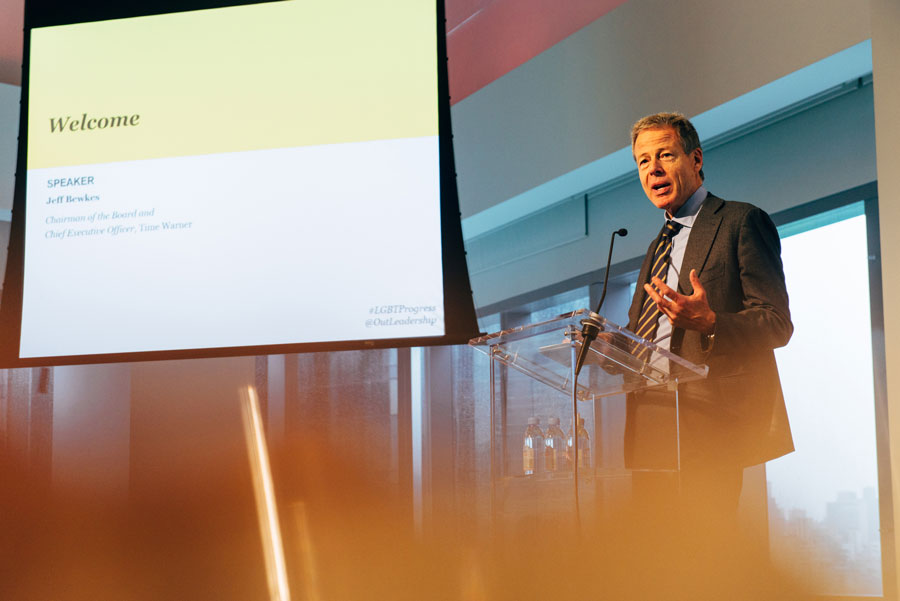
Jeff Bewkes, Chairman and Chief Executive Officer, Time Warner Inc., kicked off the day: “We believe very passionately in the power of stories to connect us. We’re here today to talk about diversity. It’ s a word, and an idea, that cuts across so many aspects of life – the experiences we have, the different societies in which we live. The kinds of occupations we pursue. The ways we think, and the different points of view we each bring and want to make accessible, to communicate with one another about. For us, that means casting the widest possible net. This is Time Warner’s business now – at HBO, at Warner Brothers, at Turner – how do we tell a diversity of stories, sensitively, fairly?”
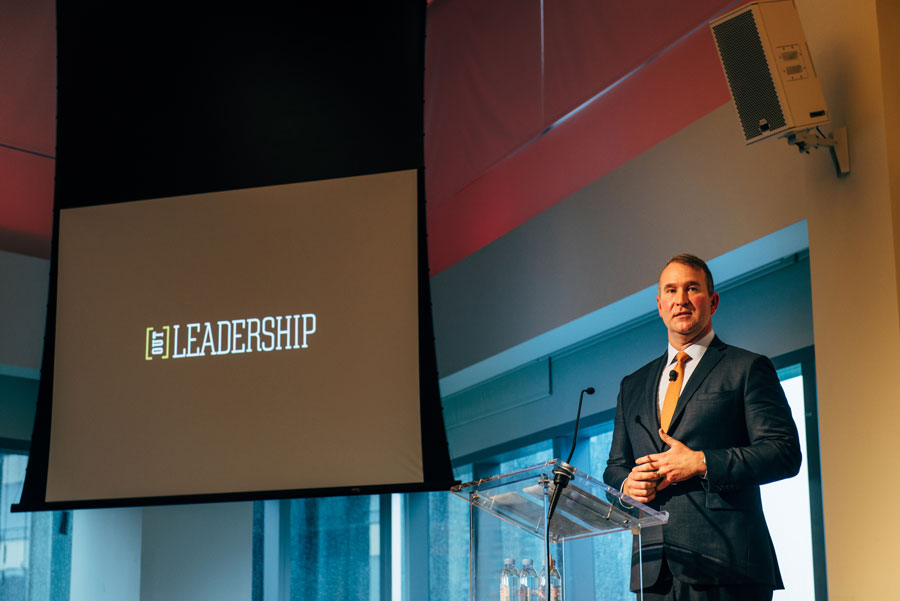
Todd Sears, Founder & Principal of Out Leadership, framed out the Summit’s theme: “Despite the current challenges we face, I’m incredibly optimistic about the future of our movement. Because we’ve spent a long time – including the last six years of Out Leadership – preparing for this moment. If you think about the amicus briefs that most of the firms in this room have signed, and the CEO statements on LGBT+ nondiscrimination issues, and the conversation we’ve created around LGBTP+ inclusion as a business driver – none of that is going away.”
“A few months ago, we hosted an event at U.S. Trust with Kate Clinton and Urvashi Vaid,” Sears concluded. “If you know them, you know that, one, they’re hilarious, and two, their incredibly intelligent. It was a great night. But one of the comments in that conversation was, ‘It’s going to be like the ’80s again.’ And I thought: “Actually. no, that’s not true. We didn’t have nearly the allies then, that we have now. We didn’t have the corporate voices speaking out. We didn’t have CEOs. We didn’t have all of the structures and the support systems we’ve built today.” And I believe that is what’s going to carry us forward.”
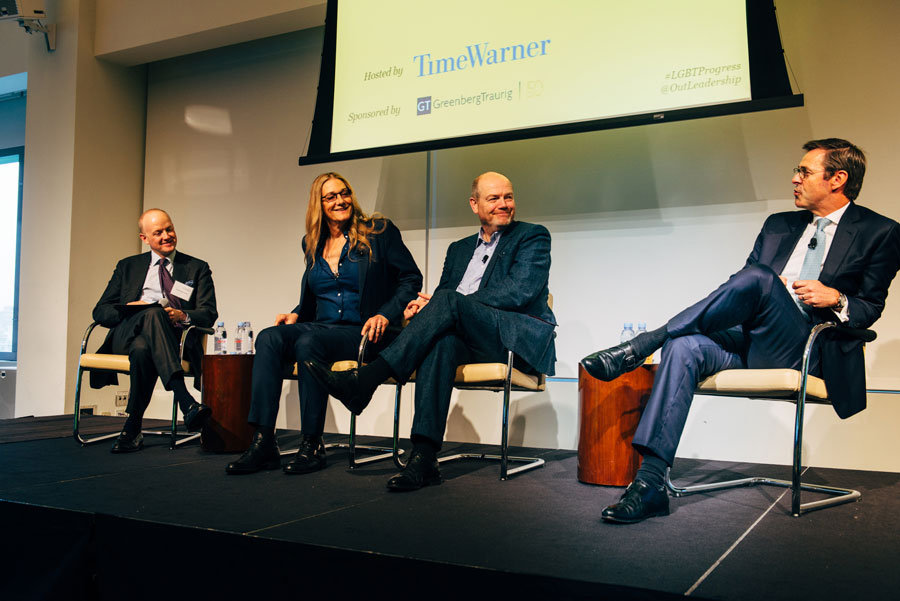
Alexander Saint Amand, Chief Executive Officer of GLG (above left; Mark McCombe at right), moderated the Summit’s CEO panel, noting that LGBT+ inclusion is an issue that can potentially reshape political coalitions: “We’re here to talk about the role of business on this issue. We know that 90% of the Fortune 500 have anti-discrimination policies inclusive of LGBT+ people, and that’s just one data point among many that makes it clear that business is the tip of the spear on this issue that cuts across political divides. There may be other crossover issues – climate change, incarceration rates, school choice – but the demographic implications of rising millennial support for LGBT+ inclusion are particularly important.”
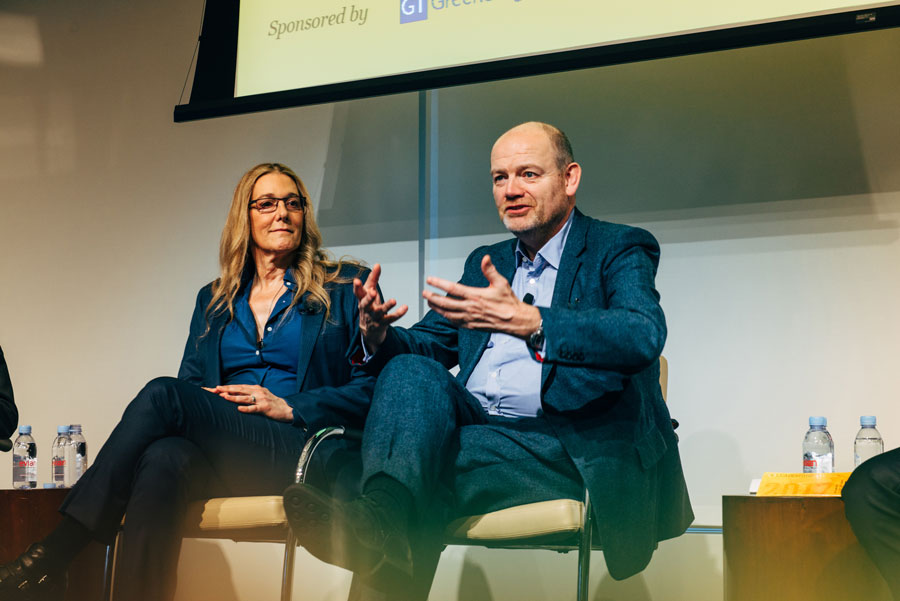
Mark Thompson, Chief Executive Officer of the New York Times Company (above right; Martine Rothblatt to left), spoke about the ways discourse can work – and fail to work – to drive equality forward. “The recognition of same sex marriage is a great, encouraging example of a very carefully and effectively framed argument – an appeal around fairness and equal treatment, which struck a chord with a very broad section of the population. And I’m not suggesting that battle is over, but we have a sense that it is a battle that was won in many hearts, and that ultimately will be won everywhere. And that’s an example of the discourse working. But that’s one battle in a broad war about acceptance of diversity, and I think not every battle is going that well.”
Thompson continued: “I bet I’m not the only manager in this room who had the experience, last November, of discovering that the members of pretty much every minority group represented in my company responded to the to the election results with some level of personal disquiet, anxiety, or even fear. And now we have a sense of needing to assert our values, assert our willingness to support all of our colleagues. On a broad range of questions, across a broad front. It’s about immigration status, it’s about ethnicity, it’s about LGBTQ issues, and other issues as well.”
Mark McCombe, Head of the Americas, BlackRock, and Global Head, BlackRock Alternative Investors, encouraged Summit attendees to be conscious of the good company they keep: “I would say to everyone at today’s Summit, don’t underestimate the power you have together. The fact that this conference is going on, and the progress that’s been made, is quite impressive. When you look at companies that are innovating, that are creating new technology and pushing the boundaries, it’s the companies that embrace a kind of ‘can-do’ frontier spirit that seem to succeed best.
Martine Rothblatt, Chief Executive Officer, United Therapeutics, noted that businesses and corporate leaders face complex challenges when it comes to the question of doing business in places with legal and social environments that make it challenging for LGBT+ people – but that she believes that creating incentives for policy to improve is likely to be the most successful strategy: “We have about 350 employees in North Carolina, it’s our largest concentration of employees in a state, and the state has become quite iconic in terms of at least one aspect of the battle for LGBT+ rights. We faced quite a few calls to leave. It’s an interesting position to be in when you are an openly transgendered CEO in a state like North Carolina. It’s been, really, a fascinating personal experience. I’ve received a lot of very personal criticism on this issue.
And as an aside, that’s one reason why I cannot say enough good things about Todd Sears and Out Leadership. It seems to me that my personal attitude is that an ounce of carrots is worth a ton of sticks. and people are much more motivated to go toward the positive than to withdraw from the negative.
Unlike some other companies, who were able to cancel planned expansions, it would have been completely impractical for us to move our operations out of North Carolina. But we turned the other way, and we said, we want to be a role model to help bring North Carolina into the future. And we’re still working in North Carolina, to help the state to change, instead of running away. Motivating people to pursue positive rewards is more effective than penalizing people.”
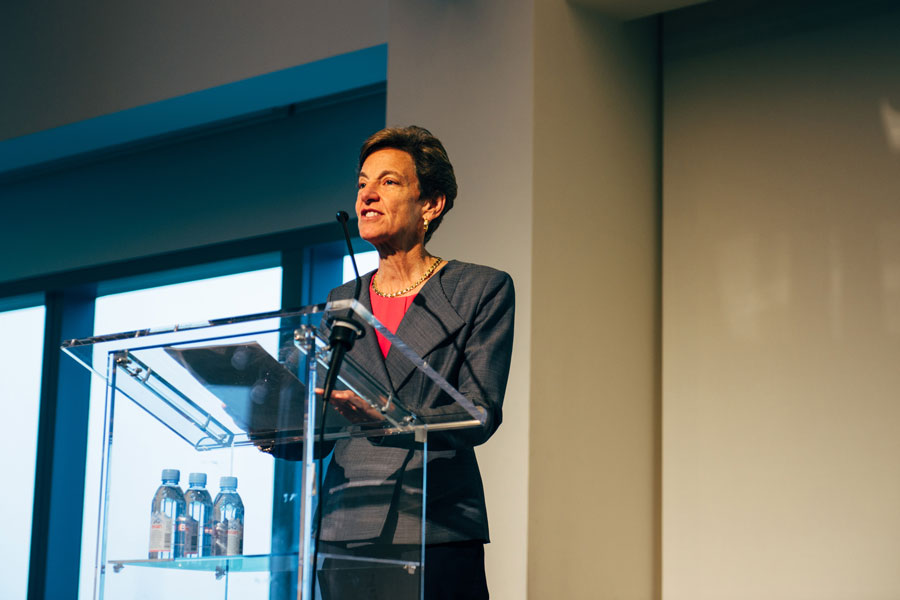
Next, Jean Veta, Partner, Covington and Burling introduced our keynote speaker, 82nd Attorney General of the United States Eric Holder, who was interviewed by Jonathan Capehart, Editorial Board, The Washington Post: “As we all know, General Holder made a momentous decision when, in 2011, he decided to decline to defend the Defense of Marriage Act. This brave demonstration of leadership is what laid the groundwork for the landmark victories we subsequently achieved in the Supreme Court.”
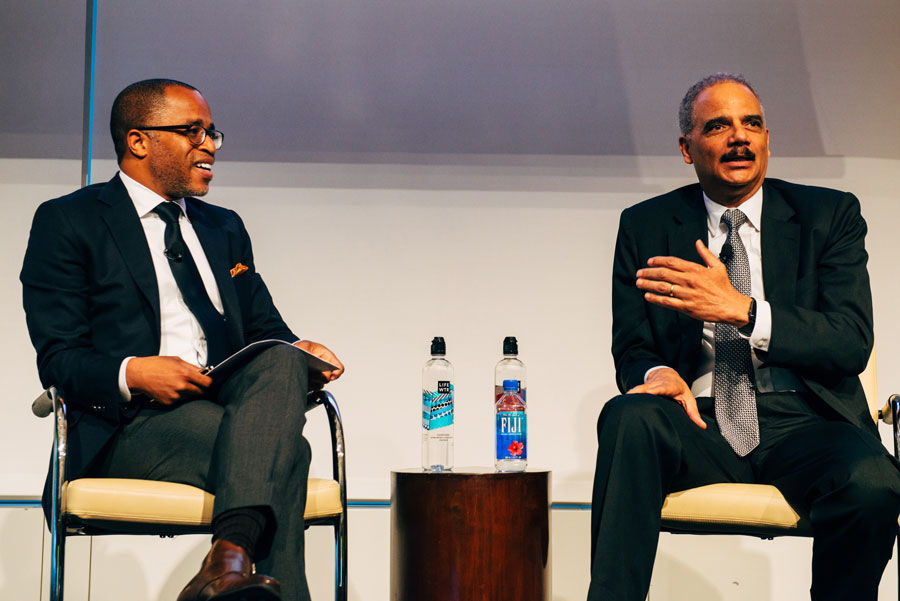
Eric Holder (above, right; Jonathan Capehart to left) noted that: “[The decision not to defend the Defense of Marriage Act] was, for me, a decision that had both legal and moral dimensions. If you looked at the legislative history of the Act, there were a couple things said in its favor on the floor of the Congress when it was being debated, there were legal deficiencies. And then just on the moral side, if you look at the history of discrimination and inappropriate treatment that people in the LGBT+ community have had to endure in this country over the centuries, I did not want my Justice Department, and President Obama did not want his administration, to be on the wrong side of history. In Brown v. Board of Education, you don’t want to be the people who supported the Board.”
Capehart observed that Mr. Holder has not been shy in describing the quest for equal rights for the LGBT+ community as the Civil Rights Movement of the times: “Now, there are a lot of African Americans, who are still totally resistant to the idea that marriage equality and freedom from discrimination, those fights about LGBT+ equality, have anything to do with civil rights. Yet, you run headlong into it and say, ‘Absolutely it is.’ Why do you put it in those terms?
Holder responded: “It’s the language that speaks to the issues that we still have to confront. It is so similar to the issues that we faced as a nation in the ’50s and the ’60s when it came to fighting for the rights of African Americans to vote, to have access to public accommodations. The similarities are striking. The language that was used then I think is appropriate to be used now. The tactics that were used then I think can be used now. The need to raise the consciousness of the nation about how unfairly a group of people are being treated and have been treated, same kinds of things. It doesn’t mean it’s the only civil rights issue of the day, but it is from my perspective, a primary one.”
“What I would want the community and the nation to understand is that positive change is always possible, it’s always possible, but the possibility of positive change is not something that we can take for granted,” Holder concluded. “Dr. King said that arc of the moral universe is long and it bends towards justice, it only does that, though, when people reach up and grab that arc and pull it towards justice… The possibility of positive change in the Trump era is still there but it requires work, it requires perseverance, it requires an understanding that it’s not going to be linear problems, there are going to be setbacks.”
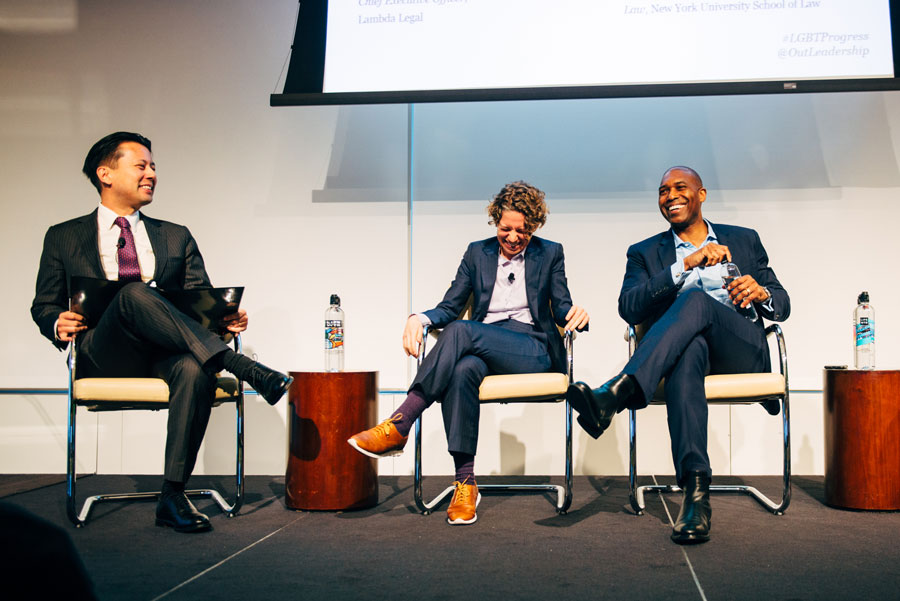
Next, Kenji Yoshino, Out Leadership Global Advisory Board Member and Chief Justice Earl Warren Professor of Constitutional Law, New York University School of Law (above, left), moderated the Out in Law panel, focused on LGBT+ rights in the age of Trump – and how the private sector and the public interest could potentially intersect.
Rachel B. Tiven, Chief Executive Officer of Lambda Legal (above, center), gave her gloss of the current legal landscape for LGBT+ rights: “I think it’s a best of times, worst of times scenario. The Executive Order the White House released yesterday was significantly walked back from what had been leaked, not just in February but much more recently. Lambda Legal and the ACLU were very public that we were ready to sue, and had the leaked draft reflected what was signed yesterday, we would be filing today.
“What was released yesterday was a lot of bark, not a lot of bite,” Tiven continued. “You can tell by the response from our adversaries, the National Organization for Marriage, and the Alliance Defending Freedom, these are right-wing legal groups that are hell-bent on hurting LGBT people. They were very disappointed. The National Organization for Marriage communication to their supporters said, ‘We were promised better, but the LGBT activists shut us down.’ That, I think, shows certainly some opportunity to influence the larger conversation and, ultimately, the White House. However, the most homophobic, transphobic, aggressively hostile people in the country are running the federal agencies and they can hurt us very directly. That’s the worst of times piece.”
“The best of times piece is that we really are at a turning point,” Tiven concluded. “Attorney General Holder and Jonathan talked about the Hively case, the case that Lambda Legal brought on behalf of Kim Hively, for which the Seventh Circuit just ruled by a vote of 8 to 3, that her having been fired because she is a lesbian is a form of sex discrimination under Title 7 of the Civil Rights Act. We really are at a huge turning point in proving that LGBT discrimination is a form of sex discrimination and that the protections of sex discrimination are available to LGBT people. There’s an enormous amount to work with – but under very tough circumstances.”
Yoshino turned the panel to the question of how big businesses will stay engaged with the legal debate in a post-marriage equality context: “When I talk to a lot of my colleagues in the corporate world, they say things like, ‘the marriage decision was really easy because that’s a situation of like right versus wrong.’ But the debate is now being framed as right versus right. And corporations, and managers of people within them, must now address people who are on the one hand saying, ‘LGBT+ rights,’ and others who are saying ‘this impinges on my free exercise of religion. I’m hearing that this issue of the religious right to discriminate is actually much harder for organizations to deal with, is that your sense?”
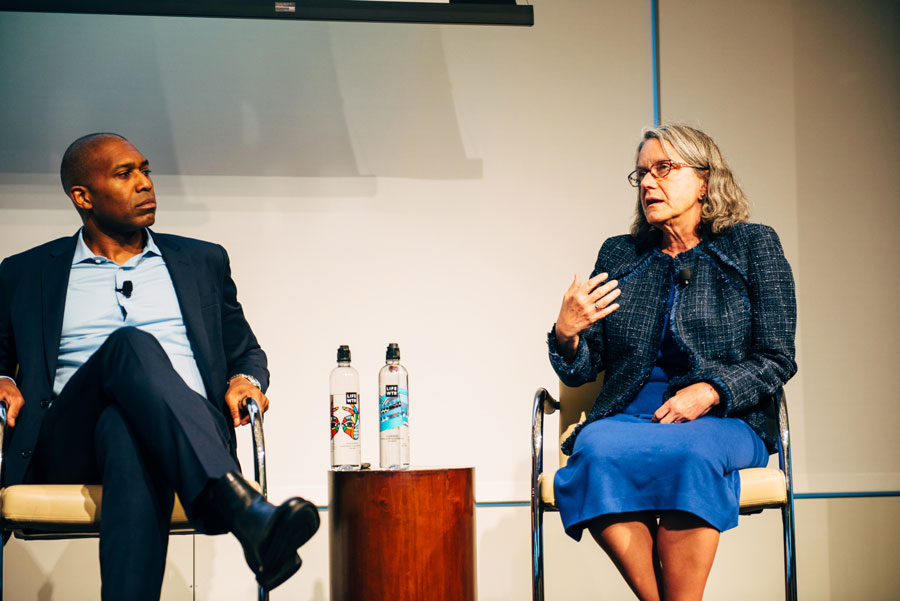
Janet C. Boyd, Director of Government Relations and Legislative Counsel, The Dow Chemical Company (above, right), responded: “Our company is not as much of a customer-facing company as some others, and perhaps that gives us a little bit more of a license to be very clear where we are with regard to LGBT+ inclusion. We are now, and for the last 10 years or so, very public with regard to our opposition to any kind of legislative effort to use religion as a subterfuge for discrimination. We’ve been out there both at the state level as well as at the federal level being very vocal and saying that this isn’t appropriate.”
Tony West, Executive Vice President of Government Affairs, GC and Corporate Secretary, PepsiCo, noted (above, left): “We’re in a war for talent. We need the best talent we can possibly attract. We aren’t looking to make judgments about where that talent comes from as long as it is the best. In this competitive environment, you can’t be anything but open and inclusive if you’re going to be a place where people want to make and build careers. That’s just the business reality.”
“And further,” West concluded, we want to make sure that the people who work with us feel like their contributions are valued. The last thing anyone should have to worry about at work is whether they’re going to be treated in a discriminatory way. We’ve been very, very clear that we just don’t tolerate discrimination. We have a set of values reflected in our Code of Conduct and if you want to be a part of our team, you accept that non-discrimination is one of those fundamental rules of engagement.”
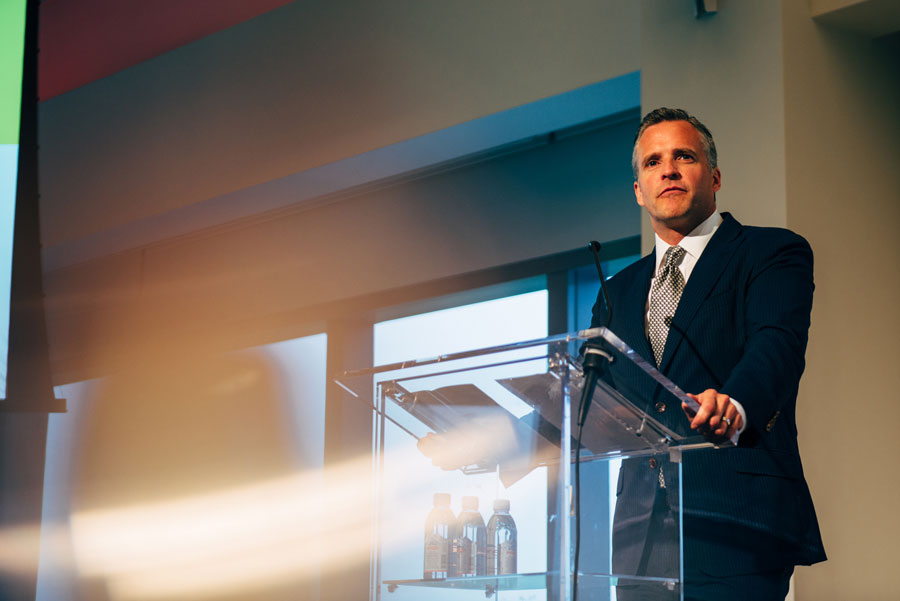
As the Summit drew to a close, Rufus Gifford, former Ambassador to the Kingdom of Denmark, remarked that the United States’ global leadership on LGBT+ issues will be missed:
“My sexual orientation was important to the story that I was trying to tell about the United States as Ambassador. Why? Because part of the job of an ambassador is to talk about about the country you’re from. And I was to talk about how the United States had progressed. Whether we were talking about healthcare or climate change or human rights or LGBT+ rights, I would sit in a country like Denmark, which is frankly light years ahead of the United States on every single one of those issues, and say to the people of Denmark: we are making strides. We have changed. Politically, we are now doing things we have never done in our history and we are on the right track – please encourage us.
“And every year, on instruction from the State Department, the Embassy would march in the Copenhagen Pride Parade, Gifford continued. “And I’d do it with my husband. And the first time we did it, I wondered what sort of reception we’d get. It could feel sort of like cultural imperialism, marching in the Copenhagen Pride Parade, waving an American flag. And, I’ll never forget the conversation I had with a French guy one time at Pride. He was a complete and he said, ‘You know, we as French people have been looking down our noses at the United States on issues of human rights since essentially our very founding. You all are a bunch of evangelical cowboysm, who are not particularly sophisticated. But there you were with your husband waving the American flag in the Copenhagen pride parade and that moment I just gained so much more respect for this journey that the United States has been on.’”
“When the United States speaks, people listen,” Gifford concluded. “It truly can’t be overstated. It matters when President Obama did things like stand next to the President of Kenya, who told him explicitly, ‘please don’t talk about LGBT rights,’ and President Obama did it anyway. And the United States’ leadership on these issues will be missed.”
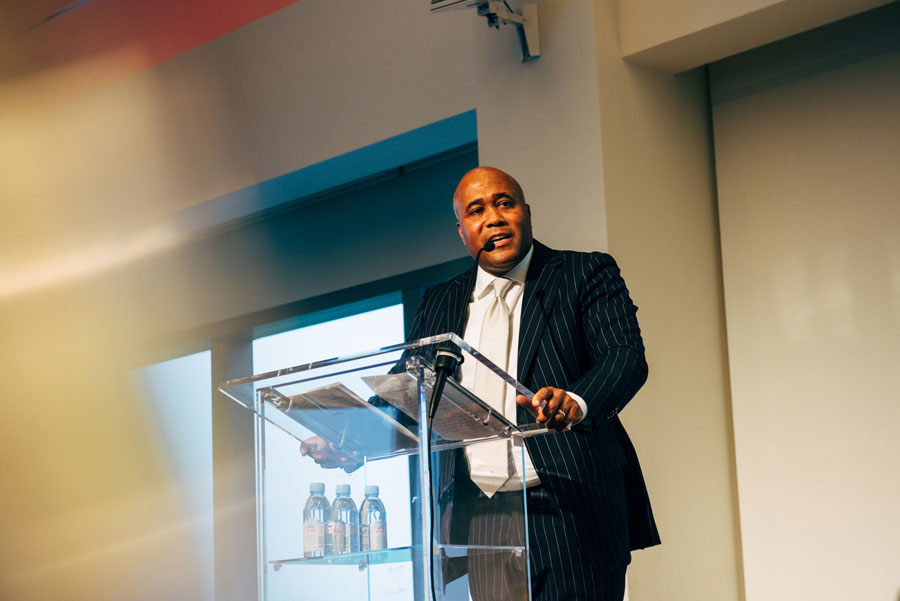
Ernest Greer, Co-President of Greenberg Traurig, LLP, brought the house to its feet with his inspirational final remarks: “I encourage everyone here to remember that once we get a seat at the table, we’ve got to get to work. We can’t be proud simply to be supporters of Out Leadership. We can’t be proud simply because we give money to other organizations that are focused on the African American community, or some other diverse community. We can’t be proud simply because we hire one or two people of diverse backgrounds. We can’t be proud simply because we run ads.”
“No, because far too long we have waited for others to come along. You see, after 50 years of waiting, I have lost patience waiting for those who are not with us,” Greer concluded. “In 2017, it’s our time. Those of us in this room, those of us in this room, must demand change in our companies and with our elected officials. Each of us has that ability. But I don’t know if we each recognize that we have the obligation to drive change. Let’s get on with it. Let’s be leaders in our companies. Let’s be leaders in our communities, and let’s lead in a way that embraces and celebrates our identities. We have the unique ability, the unique opportunity to affect change. Don’t waste it.”